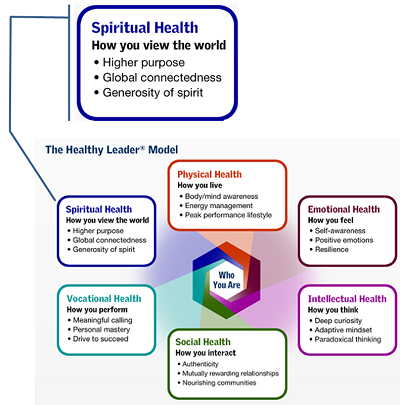When you walk in the room, who shows up for Read more →
The Leader’s Spiritual Health
Posted Tuesday, May 21, 2013Allen Slade
When leaders face unpleasant tasks or difficult demands, they must tap into a reservoir of motivation. Their motivation can be internal or external, but if the reservoir is dry, leaders will not be motivated to do what must be done.
Early in my career, my manager would respond to complaints about workload by saying “That’s why they pay us the big bucks.” He was trying to motivate us through the external reservoir of rewards. Since we were paid less than average, his words were not especially motivational.
Yet, my group was quite motivated. We were creative and diligent, we worked long hours without overtime and we changed the company for the better. It was because of our internal reservoir of motivation – our higher purpose, our global connectedness and our generosity of spirit. We discussed our plans in light of the bigger picture. We gave without expecting a return. In other words, our spiritual health kept us going in the face of difficulty.
In my series of posts on The Healthy Leader® model (from Bob Rosen of Healthy Companies International), we have considered the leader’s physical, emotional, intellectual, social and vocational health. Today, let’s look at the leader’s spiritual health.
Modified from an image courtesy of Healthy Companies Inc.
Spiritual health is your ability to tap into a sense of connection with something bigger than yourself and to feel compassion and empathy for others. Spiritual health drives social responsibility and helps us see opportunity in the midst of adversity.
Spiritual health may flow from religious beliefs, but spiritual health is not the same as religion. There are religious believers who are motivated by rewards and punishments, which is not spiritually health. There are people who are not especially religious who have a higher purpose, global connectedness and generosity of spirit. Let’s take a deeper look at the leader’s spiritual health.
Higher Purpose
Do you ever ask yourself “Why am I here?” The spiritually healthy leader has a good answer, because they can see the higher purpose of what they are doing. They work to improve the lives of others. They see the legacy they are building at work. They enjoy fulfilling their organization’s higher purpose and they get a charge out of making a difference in the world.
Knowing why you are here also helps you engage others in your organization. When I became Director of Microsoft People Research, the organization was known for doing an annual employee survey. I helped create a higher purpose for our group and I engaged senior leaders to help contribute to Microsoft’s positive impact on the world. I still have the fleece vest.
Global Connectedness
As the vest says, “Do great research. Create insight. Change Microsoft. Change the World.” Spiritual health goes beyond improving your own work or even your own organization. You strive to improve the world. You see every decision as having the potential to make things better for all. Your vision includes people with different traditions, cultures and religions. You look for the best ideas from around the world and you strive to improve things locally and globally in all of your work.
Generosity of Spirit
Spiritually healthy leaders pay it forward. They do good without expecting to receive something in return. They are optimistic, generous, empathetic and compassionate. They are a role-model for sharing and giving back.
Bottom line: Your spiritual health as a leader flows from your higher purpose, global connectedness and generosity of spirit. By tapping into something bigger than yourself, you will keep your internal reservoir of motivation full for the frustrations you face. You will also be a role model for the people you lead.




This is a very helpful insight. I agree totally that spiritual health is a fundamental driver for optimizing our potential to improve the world around us. May I have more of it.
Anastasiah, may your pursuit of spiritual health be fruitful for yourself and those you lead.
Spiritual health, for me is the ultimate road of survival. Without taking time to meditate and find my inner peace, especially when I am in turbulent waters, is disaster for me. I have to be able to think and ponder on my thoughts, actions, situations, responses; to reflect and evaluate myself. I know that I will see what I need to which propels me forward; to understand the situation from a higher perspective and enabling me to set forth my skills, talents, and insights to the situation. It is okay to make mistakes. We learn more in the valley than we do at the mountaintop. We have to learn as adults how to tap into that inner child so as to bring about the playfulness and fun that is the creative aspects of ourselves. To set aside or push the inner child within aside, is a grave injustice.
Excellent insights. Furthermore, I think we need to pursue spiritual health before the storm, not just during the storm. Otherwise, we are trying to draw on reserves that are insufficient for the crisis.